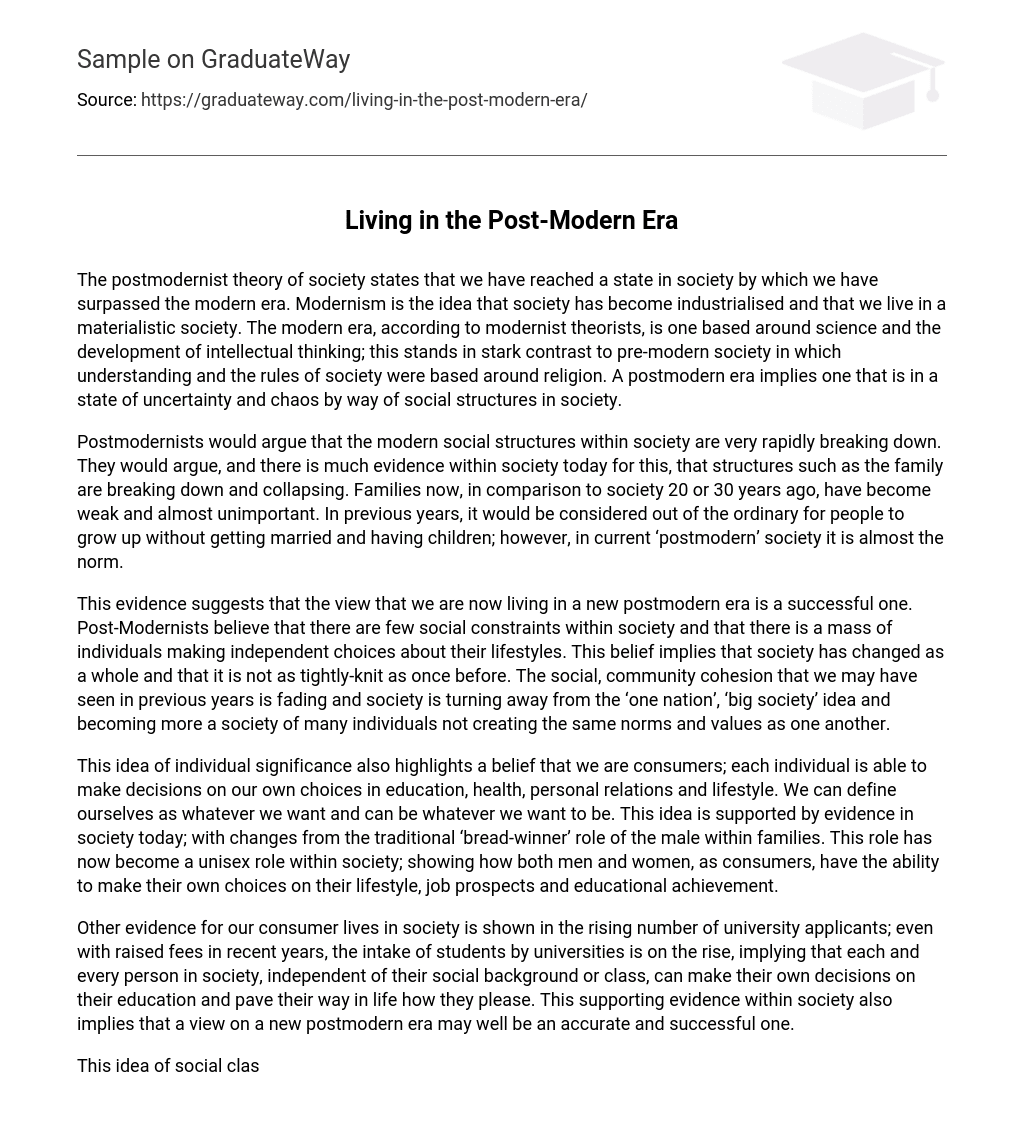The postmodernist theory suggests that society has moved away from the modern period, which was characterized by industrialization and materialism. Modernism emphasized science and intellectual thought, while pre-modern society relied on religious beliefs to understand societal norms. In contrast, the postmodern era is marked by uncertain and chaotic social structures.
Postmodernists claim that social structures in society are rapidly deteriorating, citing the breakdown and collapse of traditional structures like the family as evidence. They argue that families have lost strength and importance compared to previous decades. In the past, it was rare for individuals to grow up without marrying or having children. However, in today’s “postmodern” society, this has become nearly commonplace.
The evidence presented indicates that the current era is effectively a new postmodern one. Post-Modernists argue for the existence of limited social restrictions within society and emphasize the prevalence of individuals who independently make decisions about their lifestyles. This perspective suggests that society as a whole has undergone significant transformation, resulting in reduced interconnectedness. The sense of unity and community that was once prominent is diminishing, and society is transitioning away from being a unified ‘one nation’ or ‘big society’. Instead, it is evolving into a diverse society comprised of numerous individuals who do not conform to shared norms and values.
This concept of personal importance underscores the notion that we are all consumers, each with the liberty to exercise our own judgments pertaining to education, health, personal relationships, and lifestyle. We possess the independence to shape our identities as we see fit and embark on any path we wish to pursue. Evidence supporting this can be observed in contemporary society where the conventional role of men as primary providers for families has evolved into a gender-neutral role. This shift demonstrates how both men and women, as consumers, hold the power to determine their own choices concerning their way of life, career prospects, and academic accomplishments.
Furthermore, the rising number of university applicants provides proof of our societal consumerism. Despite the recent escalation in tuition fees, universities continue to accept more students, indicating that people from various social backgrounds and classes can freely select their education and pursue their own life trajectory. This evidence further reinforces the concept of a thriving postmodern era.
This theory of social class and background is also addressed by postmodern theorists who suggest that both social class and family structure are becoming less distinct and more interconnected. According to them, contemporary society does not have definite boundaries between different social classes, so it would be imprudent to categorize individuals as “working class” or “middle class”. Instead, our success in life is determined by our personal ambitions.
Despite differing views, evidence suggests that social class divisions persist and greatly affect society. This is evident in various aspects of societal institutions, including education and particularly in UK politics. Some analysts contend that an influential elite culture perpetuates wealth inequality by favoring the rich and disadvantaging those with less affluence.
Contrary to the belief that social class division is diminishing, evidence suggests otherwise. While some argue that political factors, such as the presence of parties like the Labour Party, promote a more equal society, critics contend that equality is often manipulated by catch-all parties for electoral gain and that politics predominantly caters to the middle class. Consequently, it can be inferred that the notion of living in a new postmodern era is flawed and ineffective.
According to postmodern theorists, society is saturated with media. Baudrillard believes that media imagery dominates life in a postmodern society to the point where he refers to it as “media-saturated.” The prevalence of advertising campaigns on television and the influence of moral panics on individuals in society provide evidence of how the media dominates. This saturation of media could potentially result in society losing substance and becoming an intellectual wasteland or a “hyper-reality,” where independent social thinking is abandoned and individuals are controlled by media-induced trends and fashions. Giddens suggests that as a consequence, our world has become a fictional universe. The existence of evidence in society supporting this idea of media-saturation, as observed by Baudrillard, suggests that the notion of living in a new postmodern era holds weight and is successful. Baudrillard also argues that postmodernism involves the consumption of desires and pressures created by the media, resulting in individual identity no longer being shaped by factors like class, gender, and ethnicity.
According to Baudrillard, the media’s influence on our identity has become significant and may even play a role in shaping it. Consequently, we have forfeited our sense of uniqueness and autonomy within society. Bauman contends that living in a post-modern society is akin to residing in a shopping center, where individuals can freely choose and build their preferred identities. This notion of “Pick ‘n’ Mix” identities implies a transition towards a fresh postmodern era, affirming the accuracy of aligning with these theories.
To conclude, I assert that the perspective that we are presently residing in a fresh postmodern period has significant validity and is highly plausible, although it is not without its imperfections. Nevertheless, no sociological theory is flawless; the concept of postmodernism is profoundly substantiated by societal evidence and is credible to contemporary (or postmodern) individuals. The indicators of a conclusion to the modern era are readily discernible for us as individuals, simply requiring a focused examination of society for them to become apparent.





